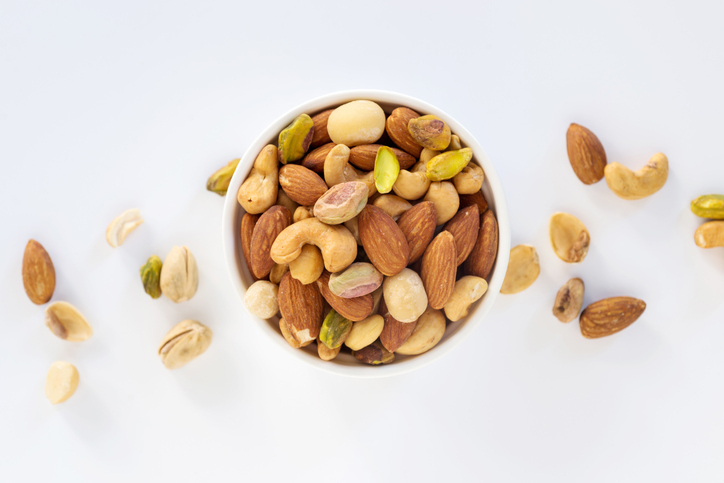How Your Diet Affects Your Thyroid
Bioidentical progesterone supports thyroid function and can be extremely helpful, but did you know that everyday dietary items can also make a difference?

Women at menopause are frequently diagnosed with underactive thyroid and given medication for it. There is a link between thyroid and menopause, but it is more to do with the tendency of women in this phase of life to experience auto-immune problems.
The late Dr John Lee, the pioneer of bioidentical progesterone cream usage, was surprised by the number of menopausal women in his practice who had thyroid issues and he used bioidentical progesterone cream to help their symptoms.
What does your thyroid need to be healthy?
However naturally healthy your diet is, there are some things that are specifically needed to help your thyroid function well.
1. Salt because your thyroid needs iodine to work effectively. Most people get enough of this from their diet, usually through fish and dairy products.
Make sure you’re using iodised table salt at home and you can tell by looking at the label.
2. Leafy greens such as spinach and lettuce, and the other leafy greens, are great sources of magnesium, a mineral that plays a huge role in your body processes.
Fatigue, muscle cramps, and changes in your heartbeat could be signs that you’re not getting enough.
3. Nuts are something we tend to be cautious of as they can be fattening, but cashews, brazils, almonds, and pumpkin seeds are excellent sources of iron.
Brazil nuts help your thyroid in another way too because not only are they a good source of iron, they’re also rich in selenium, another mineral that supports your thyroid. Just a few each day give you the selenium you need.
4. Seafood is a great source of iodine so eat plenty of fish, shrimp, and seaweed because you need iodine for a healthy thyroid.
BUT but avoid large amounts of iodine-rich choices like kelp as that may make your condition worse.
What does your thyroid not need too much of?
So those are all the things that will be a great addition to your diet, but there are also some things you should check as they can affect your thyroid negatively.
1. Kale and other vegetables are mild goitrogens, compounds that interfere with the normal function of the thyroid gland. They make it more difficult for the thyroid to produce the hormones your body needs for normal metabolic function and in rare cases can prevent the thyroid from getting enough iodine.
This is also the case for cabbage, broccoli, cauliflower, and Brussels sprouts but they shouldn’t be a problem for you unless you get very little iodine in your diet and you’re eating large amounts of these vegetables.
2. Soy is something that can affect thyroid only in rare cases as some of the chemicals found in soy products like soy milk or edamame could hurt your thyroid’s ability to make hormones, but only if you don’t get enough iodine and eat large amounts.
Just like with kale, if your iodine levels are OK, you probably don’t need to worry about soy.
3. Organ meats can be an issue if you eat things like kidneys, heart, or liver because you might get a lot of lipoic acid. That’s a fatty acid found in these and some other foods and is also available as a supplement.
But if you get too much, it could interfere with the way your thyroid works and could also affect any thyroid medicines you take.
4. Gluten is a protein found in wheat, rye, and barley. Unless you’ve been diagnosed with coeliac disease, it probably won’t affect your thyroid.
Gluten can damage the small intestines of people with coeliac disease. They can have other autoimmune disorders like Hashimoto’s disease (which leads to an underactive thyroid) and Graves’ disease (which leads to an overactive thyroid).
If you have coeliac disease, a gluten-free diet may help prevent these thyroid disorders.
How food can affect thyroid medication
The foods you eat can affect your thyroid medicine as they can slow down how your body absorbs it.
One way to help with that is to take medicine on an empty stomach, preferably in the morning, and to be aware of items that can interfere with it. Afterwards, it is recommended you avoid eating or drinking for 30-60 minutes
Levothyroxine interacts with minerals such as iron, calcium, and magnesium, which lower the activity of thyroid medicine. Many antacids contain magnesium and aluminium, so avoid taking them when you’re on the thyroid medication.
Avoid taking your thyroid hormone at the same time as:
- Coffee if having it with milk
- Calcium supplements
- Walnuts as they can interfere with absorption of thyroid medication
- Iron supplements or multivitamins containing iron
- Antacids that contain aluminium or magnesium
- Some ulcer medications, so check with your pharmacist or doctor
Helpful information:
Thyroid conditions do seem to become more frequent at Menopause, and one of the many balancing functions of progesterone is to support healthy thyroid function. This article will be helpful in explaining why.


















